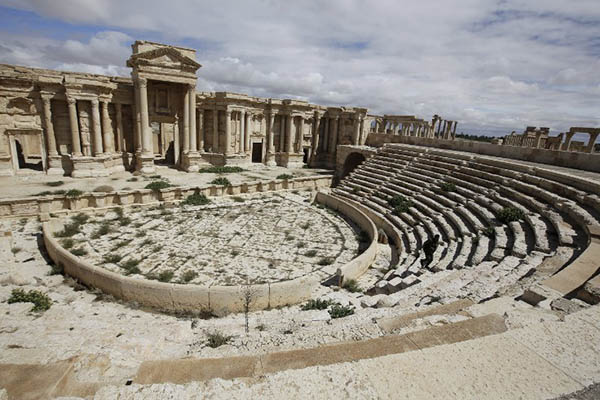
Joseph Eid—AFP
Unanimously approved resolution seeks to prosecute perpetrators of destruction for war crimes.
The United Nations Security Council on Friday strengthened its protection of global cultural heritage sites threatened by armed conflicts, saying perpetrators of unlawful destruction could be prosecuted for war crimes.
From the Bamiyan Buddhas in Afghanistan to the ancient shrines of Timbuktu, deliberate attacks against the world’s great heritage sites have multiplied in recent years. In a unanimously approved resolution, the Security Council called for a systematic defense of cultural heritage sites, following early steps taken in the aftermath of Islamic State group attacks in Iraq and Syria.
The resolution calls for the protection of historic monuments and sites in any conflict zone regardless of geography or type of attack, whether for destruction, theft or trafficking. “Directing unlawful attacks against sites and buildings dedicated to religion, education, art, science or charitable purposes, or historic monuments may constitute, under certain circumstances and pursuant to international law a war crime and that perpetrators of such attacks must be brought to justice,” it said.
In a sign of the international community’s growing get-tough stance on heritage, the International Criminal Court in the Hague on Tuesday sentenced a Malian jihadist to nine years in prison for the war crime of attacking Timbuktu’s treasured shrines and a mosque.
The new U.N. resolution calls on countries to create specialized units to protect cultural heritage and for stronger international cooperation to thwart the trafficking of cultural goods from conflict zones. “The deliberate ruthlessness against humanity’s patrimony stems from a will to destroy memory,” said Audrey Azoulay, the French minister of culture, who presented the text together with Italy. “It’s the same destructive will that aims at the flesh of women, men, children but also at stone, clay, the treasures of heritage, the museums,” she said. “It’s also a major threat to security because the trafficking often finances terrorism.”
The stepped-up battle to protect heritage requires significant resources that will only increase, said UNESCO director Irina Bokova, who spoke at the council’s public briefing in support of the resolution. Seven countries—including France, Saudi Arabia and the United Arab Emirates—as well as a private donor pledged in Paris on Monday to provide $75.5 million to protect cultural heritage sites threatened by war and terrorism.
